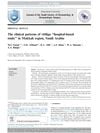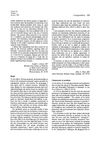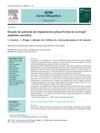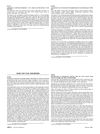2 citations,
December 2017 in “PubMed” A long-term pubic rash was finally diagnosed as white piedra and cured with ketoconazole.
 May 2023 in “Advancements in Homeopathic Research”
May 2023 in “Advancements in Homeopathic Research” Zauberöl® may help treat hair loss caused by testosterone in rats.

Combining dermoscopy and calcium fluorescent white staining improves diagnosis and treatment of hair fungal infections.
December 2020 in “Journal of Face Aesthetics” Trichoscopy effectively helps diagnose different types of hair loss in women.
 27 citations,
February 2017 in “Biomedicine & Pharmacotherapy”
27 citations,
February 2017 in “Biomedicine & Pharmacotherapy” White wax and policosanol from white wax effectively reduced hair loss and promoted hair growth in mice better than a known hair growth drug.
 19 citations,
February 2021 in “Journal of Clinical Investigation”
19 citations,
February 2021 in “Journal of Clinical Investigation” More research is needed on the health effects of hormone therapy for transgender and nonbinary people.
 1 citations,
March 2017 in “Archives of Plastic Surgery”
1 citations,
March 2017 in “Archives of Plastic Surgery” A new method using gentian violet dye makes it easier to see and work with white hair in hair transplant surgeries.
16 citations,
October 2007 in “PubMed” Vitamin B12 deficiency can cause skin darkening and white hair, but it's reversible.
 36 citations,
September 2011 in “British Journal of Dermatology”
36 citations,
September 2011 in “British Journal of Dermatology” White hair grows thicker and faster than black hair due to higher activity of growth-related genes and proteins.
 118 citations,
July 2005 in “Journal of Ethnopharmacology”
118 citations,
July 2005 in “Journal of Ethnopharmacology” Eclipta alba extract improved learning, memory, and stress-related ulcers in rats without affecting movement or causing anxiety.
 59 citations,
August 2003 in “Phytotherapy Research”
59 citations,
August 2003 in “Phytotherapy Research” Ginseng, especially red ginseng, helps hair grow by increasing blood flow and energy to hair roots.
 16 citations,
November 2005 in “The journal of investigative dermatology. Symposium proceedings/The Journal of investigative dermatology symposium proceedings”
16 citations,
November 2005 in “The journal of investigative dermatology. Symposium proceedings/The Journal of investigative dermatology symposium proceedings” Hair color is determined by different melanins and changes with age.
 August 2023 in “Research Square (Research Square)”
August 2023 in “Research Square (Research Square)” Melanocytes may trigger the immune response in alopecia areata, affecting hair regrowth.
 11 citations,
January 2014 in “Indian journal of dermatology, venereology, and leprology”
11 citations,
January 2014 in “Indian journal of dermatology, venereology, and leprology” Trichosporon inkin and Trichosporon mucoides can cause white piedra on scalp hair.
 8 citations,
January 2014 in “Journal of dermatology & dermatologic surgery”
8 citations,
January 2014 in “Journal of dermatology & dermatologic surgery” Most vitiligo patients in Makkah are young women, often with family history and thyroid issues.
303 citations,
August 1971 in “The American Journal of Medicine” Melanocytes are destroyed by factors needed for melanin production, causing vitiligo and gray hair.
 4 citations,
October 2021 in “Journal of Cellular and Molecular Medicine”
4 citations,
October 2021 in “Journal of Cellular and Molecular Medicine” White blood cells and their traps can slow down the process of new hair growth after a wound.
 2 citations,
September 2022 in “Cellular and molecular biology”
2 citations,
September 2022 in “Cellular and molecular biology” Agaricus bisporus derived β-Glucan could be an effective cervical cancer treatment with antimicrobial and antioxidant properties.
31 citations,
June 2013 in “Journal of Cosmetic Dermatology” Electrolysis is the only FDA-recognized permanent hair removal method.
 January 1989 in “Journal of The American Academy of Dermatology”
January 1989 in “Journal of The American Academy of Dermatology” Psoriasis patients have immune cells that respond more strongly to signals and stimuli due to an intrinsic cellular defect.
November 2022 in “Journal of Investigative Dermatology” Deleting MPZL3 increases skin oil production and reduces body fat.
April 2023 in “Journal of Investigative Dermatology” Proper cell death regulation is crucial for normal hair follicle regeneration and skin remodeling.
 10 citations,
May 2013 in “Actas Dermo-Sifiliográficas”
10 citations,
May 2013 in “Actas Dermo-Sifiliográficas” Most white Spanish women have a widow's peak, and their hairline measurements could help in hair restoration surgery.
 69 citations,
April 2017 in “BMJ open”
69 citations,
April 2017 in “BMJ open” Many people with alopecia experience high levels of social anxiety, anxiety, and depression, and while wigs can boost confidence, they may also cause anxiety.
 36 citations,
February 2018 in “British Journal of Dermatology”
36 citations,
February 2018 in “British Journal of Dermatology” Sweat glands and hair follicles are structurally connected within a specific layer of skin fat.
 106 citations,
October 2016 in “Cell Stem Cell”
106 citations,
October 2016 in “Cell Stem Cell” PDGFA/AKT signaling is important for the growth and maintenance of certain skin fat cells.
 3 citations,
January 2019 in “Skin Research and Technology”
3 citations,
January 2019 in “Skin Research and Technology” Frequent use of hair straighteners can cause hair loss similar to scarring alopecia in young Turkish women.
 January 2007 in “Journal of the American Academy of Dermatology”
January 2007 in “Journal of the American Academy of Dermatology” A 73-year-old man's grey-white hair turned dark brown after eczema treatment.
 January 2024 in “Journal of the Endocrine Society”
January 2024 in “Journal of the Endocrine Society” The research found that measuring androgens in urine can give extra information about body metabolism and is linked to androgen levels in the blood, especially in young girls.
 April 2024 in “African Journal of Biological Sciences”
April 2024 in “African Journal of Biological Sciences” The patient with lupus and Degos' disease showed significant improvement with treatment.






















